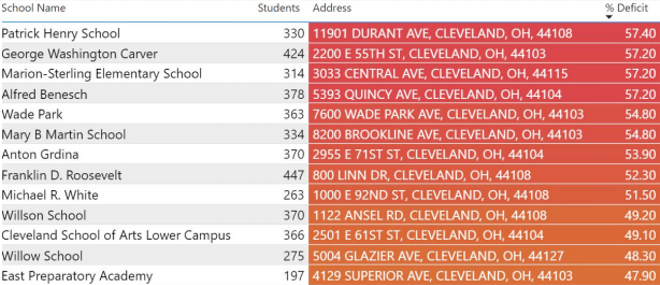In Historically Redlined Neighborhoods, Internet Access for CMSD Families Still Spotty
Nine schools within the Cleveland Metropolitan School District are located in neighborhoods where more than 50 percent of the households do not have home internet access.
Patrick Henry elementary school in Glenville tops the list, with 57.4 percent of nearby households without home internet access. George Washington Carver, Marion-Sterling and Alfred Benesch elementary schools, all located in Central, are close behind, with 57.2 percent of households without home internet.
The local nonprofit Empowering Youth Exploring Justice (EYEJ) wants to create a searchable database of information illuminating Cleveland's digital divide in greater detail as local leaders and CMSD continue to search for solutions and funding during the pandemic.
“A lot of decisions are being made on very broad, general information,” said EYEJ Executive Director Mai Moore, in a statement provided to the media. “If we want equity, we need to be really honest about what the truth is.”
As Scene has reported, digital exclusion in Cleveland is a complex problem built on a stack of deficiencies: "lack of access to affordable networks and hardware; lack of literacy or skills to navigate, consume and produce content in the digital sphere; and finally, lack of access to troubleshooting support when broadband or devices break."
As EYEJ notes, the areas in Cleveland with the most pronounced rates of digital exclusion are similar, if not identical, to historically redlined communities.
The National Digital Inclusion Alliance recently found that Cleveland is the fourth worst-connected city in the country. Nearly 2/3 of CMSD families do not have home internet connectivity.
CMSD has been working to ensure that its students all have physical devices to let them access virtual classrooms where they'll learn for (at least) the first nine weeks of the year. Schools CEO Eric Gordon sent a message to parents Sunday saying that the "vast majority" of the district's 37,000 students should now have their devices or should be picking them up today. CMSD has spent more than $14 million to purchase new equipment.
New funding is coming from other sources as well. Monday, KeyBank announced a $100,000 grant for CMSD to help them purchase wi-fi hot spots for students. State Reps also announced that CMSD was awarded a $151,466 grant as part of the BroadbandOhio Connectivity grant program.
***
Sign up for Scene's weekly newsletters to get the latest on Cleveland news, things to do and places to eat delivered right to your inbox.


